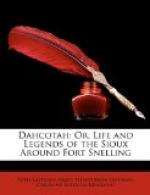CHAPTER III.
In their hours for eating, the Sioux accommodate themselves to circumstances. If food be plenty, they eat three or four times a day; if scarce, they eat but once. Sometimes they go without food for several days, and often they are obliged to live for weeks on the bark of trees, skins, or anything that will save them from dying of famine.
When game and corn are plenty, the kettle is always boiling, and they are invariably hospitable and generous, always offering to a visitor such as they have it in their power to give.
The stars were still keeping watch, when Harpstenah was called by her mother to assist her. The father’s morning meal was prepared early, for he was going out to hunt. Wild duck, pigeons, and snipe, could be had in abundance; the timid grouse, too, could be roused up on the prairies. Larger game was there, too, for the deer flew swiftly past, and had even stopped to drink on the opposite shore of the “Spirit Lake.”
When they assembled to eat, the old man lifted up his hands—“May the Great Spirit have mercy upon us, and give me good luck in hunting.”
Meat and boiled corn were eaten from wooden bowls, and the father went his way, leaving his wife and daughter to attend to their domestic cares.
Harpstenah was cutting wood near the lodge, when Cloudy Sky presented himself. He went into the teepee and lighted his pipe, and then, seating himself outside, began to smoke. He was, in truth, a sorry figure for a bridegroom. Always repulsive in his looks, his present dress was not calculated to improve him. He wore mourning for his enemy, whom he had killed.
His face was painted perfectly black; nothing but the whites of his eyes relieved the universal darkness. His blanket was torn and old—his hair unbraided, and on the top of his head he wore a knot of swan’s down.
Every mark of grief or respect he could have shown a dead brother, he now assumed in honor of the man whom he had hated—whose life he had destroyed—who had belonged to the hateful tribe which had ever been the enemy of his nation.
He looked very important as he puffed away, now watching Harpstenah, who appeared to be unconscious of his presence, now fixing his eyes on her mother, who was busily employed mending mocassins.
Having finished smoking; he used a fan which was attached to the other end of his pipe-stem. It was a very warm day, and the perspiration that was bursting from his forehead mingled with the black paint and slowly found its way down his face.
“Where is your husband?” at length he asked of the mother.
“He saw a deer fly past this morning,” she replied, “and he has gone to seek it, that I may dry it.”
“Does he come back to-night?”
“He does; he said you were to give a medicine feast to-morrow, and that he would be here.”




